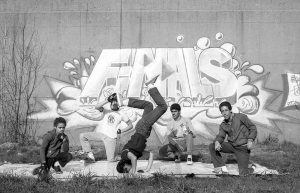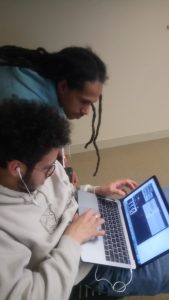Hip Hop, Hartford and the Power of Digital Storytelling
Photo: On location at Heaven Skatepark with Giana Moreno ’20, Juanita Chislom aka Empress Nijuabi, and Isabel Exstein ’19.
Tuesday, February 13th marks the premiere of seven digital stories about hip hop pioneers from Hartford. Last fall, Trinity students enrolled in my seminar course ‘INTS 344: Global Hip Hop Cultures’, and worked in teams to produce 3-4 minute multimedia narratives featuring Rick Torres, Dooney Bates, Myron Moye, Juanita Chislom, Mike Wilson, Janice Fleming and Apollo Villarini. These digital stories, along with full interviews in text and video form, will be part of the ‘Hartford Hip Hop Digital Repository’ of the Hartford Public Library.
INTS 344 is a seminar course that explores the link between hip hop, youth identity formation, and politics. Last semester I decided to take a different approach to the course. Rather than learn about hip hop through books, students were introduced to hip hop through an oral history and digital storytelling based curriculum. And, instead of examining hip hop cultures in Africa, Asia and Latin America students explored the global dimensions of the music and culture by critically interrogating the early history of hip hop in Hartford and the ways in which youth contributed to and were impacted by the culture’s emergence during the 1980s and early 1990s.
It took me about a year to completely redesign this course. I was lucky enough to receive a fellowship from Trinity’s Center for Teaching and Learning (CTL), which allowed me to utilize the resources and conversational space the fellowship provided to imagine an experimental learning course that would foment community learning and relationship building. In rethinking the course, I was immediately attracted to the ideas of oral history and digital storytelling not only because I engage with both mediums but also because I find them to be effective pedagogical approaches for promoting active learning and critical-creative thought in the classroom.
The course started to gain shape in October 2016 when I met with Jasmin Agosto, a graduate of Trinity College (Educational Studies, Class of 2010) and current staff member at the Hartford History Center (HHC) at the Hartford Public Library. I learned that she was in the preliminary stages of creating a Hartford hip hop archive. To begin that process, she was organizing an exhibition and panel discussion that she wanted me to moderate. I readily agreed and pitched her the idea of working together on digital stories about the history of hip hop in Hartford that would be made available to the public via what we are now calling the ‘Hartford Hip Hop Digital Repository’.

About a month later, the Hartford History Center sponsored “Hartford Hip Hop History: Then and Now”, a conversation about Hartford hip hop of the 1980s and 1990s and how the culture has evolved to the present. In addition to the panel, there was an archival exhibition containing posters, photographs, newspaper clippings, and video footage. Due to the positive feedback received, the HHC was fully committed to building a digital collection about hip hop in Hartford. The event was an overwhelming success and ultimately set the groundwork for the identification of Hartford hip hoppers for the digital stories for the INTS 344 course.
During the spring semester of 2017, Jasmin and I participated in CLI’s “Digital Storytelling for Community Learning” Workshop at Trinity College. Held on March 24, this all-day workshop was also extremely helpful in clarifying learning objectives, process, and assessment. I learned that, for college-based educators, incorporating digital storytelling into the college classroom allows for a transformative learning experience; builds and enhances communication skills; deepens content understanding; helps develop technical and media literacy skills; and strengthens critical thinking through peer reviewing.

Fifteen students enrolled in the course. Their majors ranged from International Studies to History to Studio Arts to Educational Studies to English. They participated in workshops that sought to equip them with the technical skills needed to construct a quality digital story while being exposed to Hartford’s rich history of cultural diversity as seen through the lens of people who used hip hop as a source of creative cultural expression and empowerment. The workshops were critical to the course’s effectiveness. Tim Wolf, a Hartford cultural activist, kicked off the semester off with a lecture about the early history of hip hop in Hartford. Christina Boyles, Trinity’s Digital Scholarship Coordinator, and Khaiim Kelly, a Hartford rap artist and educator, facilitated workshops on audio narration and beat-making, respectively. Kyle Young, a Hartford rap artist and multi-modal technician, delivered three useful workshops on the pre-production, production, and post-production phases of learning process. Overall, students learned about the unique art of narration by developing interview questions; conducting and transcribing interviews; script writing; camera operating; and editing audio and visual material by using multimedia applications such as Audacity, Photoshop and iMovie.
The students exceeded my expectations. They understood that this course was about more than a grade. I appreciated their patience, creativity, and commitment. They trusted the process in the face of many challenges. I really couldn’t have asked for a better crop of digital storytellers. This truly was a collaborative educational project. Thanks so much to the Center for Teaching and Learning, the Center for Caribbean Studies, the Community Learning Initiative, and the Educational Technology Committee for providing the necessary course development funds. I look forward to teaching this course again in the future.
Seth Markle is an Associate Professor of History and International Studies at Trinity College whose work focuses on the histories of cultural and political exchange between Africa and the African Diaspora. He is the author of A Motorcycle on Hell Run: Tanzania, Black Power and the Uncertain Future of Pan-Africanism, 1964-1974 (Michigan State University Press, 2017) and is currently working on two separate multimodal projects about hip hop culture in Tanzania and Hartford.Students from his Global Hip Hop Cultures course will present their digital stories of Hartford hip-hop pioneers at the 2018 Trinity International Hip-Hop Festival, April 6-8.


